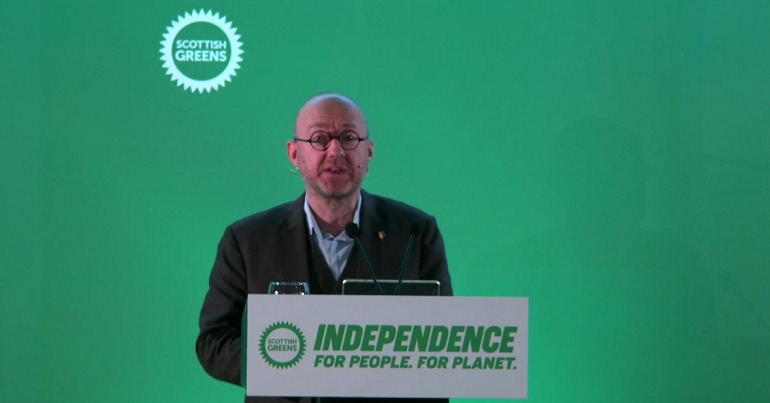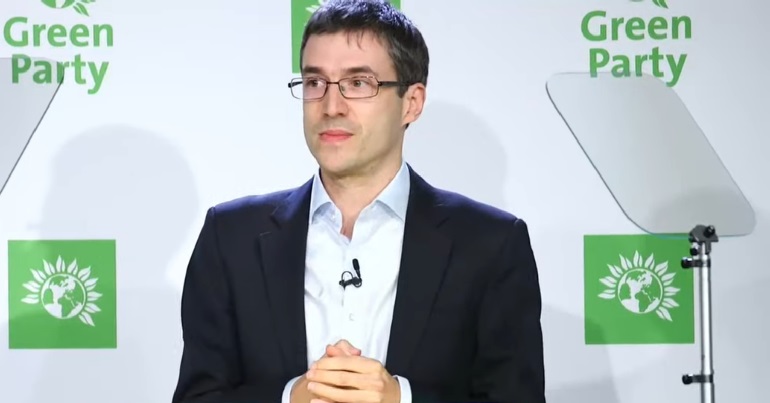Natalie Bennett on immigration policy: time for the facts, time for humanity
Whilst the main UK parties struggle to out-do UKIP, Natalie Bennett, leader of the Green Party of England and Wales, gave this speech in defence of migrants and migration two nights ago at Magdalen College, Oxford.
When I’ve spoken previously about immigration, I’ve focused on what I’ve called the “race to the bottom” in immigration rhetoric, the way in which the Tory and Labour parties have been aiming to out-Ukip Ukip in promising new laws, new rules, new restrictions, to make the lives of immigrants, and those who might be perceived to be immigrants, more difficult.
And I think this is still a vitally important issue. As I said then, this nasty, stigmatising rhetoric, which seeks to blame immigration for low wages, for housing shortages, for crowded public facilities, is not only wrong – these are failures of government policy, not a result of immigration – has serious real world consequences.
The drunk man in a pub, an irate woman on a bus, are all too likely to take this as permission, even an invitation, to take out their ire on an individual they think is an immigrant. We saw this with the stigmatisation of benefits recipients – hate crime against disabled people has soared.
This also isn’t a speech about the dreadful Immigration Bill – that’s another issue again – but about what’s happening on the ground now — the way in which we treat immigrants or would-be immigrants and visitors to Britain – the way in which we deny their rights. And the way they suffer as a result.
Last month, I visited with MEP Keith Taylor the inspiring Winchester and Southampton Visitors Group, volunteers who help asylum seekers, mostly those whose claims have been denied, to lodge new claims, and provide care, support and friendship while they spend years getting those claims heard. In December I was at the even more developed Sheffield City of Sanctuary.
Now as a general rule, when it comes to the question of explaining history or current events, I tend towards the theory that messes are more likely to be the result of “stuff-ups” than conspiracies, but when you look at the system for seeking asylum in Britain, the tortuous, incompetent, confusing maze that is demonstrably failing even in its own terms to deliver sensible decisions (25% of rulings that go to appeal are overturned), it can only be said to be a deliberate attempt to stop refugees from securing asylum, to which they are entitled under international treaties that we signed decades ago.
It’s really important to understand just what this means – the human consequences. On one of these visits I spoke to a young Zimbabwean woman who’d been, with “irregular” immigration status, in Britain for a decade – 10 years of uncertainty, of fear, of grinding poverty. Her words were simple, eloquent and heartrending.
“I feel like I’m in a cage,” she said. “I can see people outside with the key, but I have no idea when they are going to let me out.”
That’s the fate of many thousands and thousands of people. There are about 18,000 pending asylum claims, but also many more trapped in the limbo of “failed” asylum-seeker status.
In Sheffield and in Southampton, I was hearing, as I’ve heard in other places, what their life is like. They have, of course, no right to work. While their asylum cases are outstanding, they are provided with accommodation, often in “hard to let” homes scattered around the country, increasingly provided by the dreaded outsourcers like G4S and Serco, with predictably awful results.
They are given the less than princely sum of £35.39 per week on the hated Azure card, stigmatising, restricting (only to be used in certain supermarkets, mostly the big chains), and impractical (how are you supposed to pay a bus fare?)
For “failed” asylum-seekers – many of whom will subsequently put in another claim and eventually be found to be genuine refugees – the situation is even worse: destitution. A recent report focusing just on the situation in the North East talks about the state of constant fear and anxiety. And the kind of exploitation this leads to is chilling.
I’ll never forget years ago of hearing from one woman, not young, and not well, who’d spent many years as a domestic slave, sleeping on a kitchen floor, working all hours for a woman she still thought of as a “friend”.
And many of these destitute people are victims of torture, victims of abuse, victims of war – people whose lives have already involved suffering far beyond what we want to imagine.
This is Britain, this is 2014. We should not, must not, be putting anyone in this situation. People who come to Britain, seeking to follow on our proud tradition of providing asylum, should be allowed to work if they can, should be given decent benefits equivalent to those of everyone else, and decent housing.
It’s worth putting one fact on the table – refugees, asylum-seekers and stateless persons make up 0.27% of our population. 0.27%…
A further, serious human rights issues is the small, but significant number of asylum seekers who find themselves treated like criminals, detained, under the less than tender mercies and doubtful efficiency of more outsourcers. Including children, despite the promises of the Coalition on taking office. But that’s an issue that deserves a whole speech on its own.
But many more people in Britain today are suffering in other ways simply as a result of their status as “immigrant”.
This week it is ten years since the dreadful disaster on Morecombe Bay that saw 23 Chinese cockle pickers lose their lives, abandoned without training or safety equipment in an acutely dangerous environment, having been paid a pittance for their deadly hard labours.
After that came the Gangmaster Licencing Act, but it’s clear that many immigrant workers continue to be horribly exploited and abused by gangmasters.
It got rather buried by other issues, but Channel Four’s generally dreadful Benefits Street did expose the plight of a group of Romanians whose “boss” was holding their passports, and not paying them.
No doubt the 37 enforcement staff of the Gangmasters Licencing Authority scattered across the UK are doing their best, but in covering the conditions of some 400,000 farm workers, 500,000 food packing and processing workers and 10,000 shell fish industry workers, they can hardly do more than touch the surface. And funding has been cut back by 17% between 2011 and 2014, with staff cuts expected this year, this isn’t a story of improvements.
This is some of the areas of worst abuses, but what detailed studies of the foreign-born workforce show, beyond a very strong representation of skilled professionals in the Health Service, in IT, in banking … many are working in factories, particularly food processing, in food serving, and domestic work, all low wage sectors increasingly characterised by zero-hours contracts.
It’s understandable that British workers facing high rates of unemployment listen to arguments that “migration is causing your unemployment and the low wages you face”, but it’s not that immigrants are coming to Britain and saying “let me be in your heavily exploited gang”, “I want to work for poverty wages”.
The state of our low wage, insecure employment market has only one cause – the failure of the government. It’s failure to enforce our inadequate minimum wage, the failure of the government to ban zero-hours contracts and to ensure the implementation and strengthening other employment law. Well employers too have to bear some of the blame, but it can be difficult for a business, particularly smaller businesses, to compete against those behaving like corporate parasites rather than decent corporate citizens. We have to demand decent standards as standard.
It’s our government failures that’s left many migrants ignorant of their legal employment rights, left employers and gangmasters free to ignore through the limited rules and regulations supposed to control their conduct, and left even many mainstream employers able to exploit a minimum wage far below the living wage.
Sorry to be depressing, but the list of those denied what should be their rights goes on.
And the next in my catalogue are many British citizens – about 19,000 of them, on the government’s own figures, effectively denied the right to live in their own country, at least to live with their spouse of partner. For the government has changed the rules for family visas in a manner that a High Court judge has described as “onerous … unjustified.. disproportionate”.
Britons must earn at least £18,600 a year to sponsor a non-European spouse or parner’s visa – contrast that to the minimum wage full-time income of about £14,000 a year. The figure rises to £22,400 for families with a child, and a further £2,400 for each extra child.
Like, I am sure, every person in politics, I’m regularly contacted by individuals caught in this desperate trap. For the partner’s wage can’t be counted, and in a situation, faced by many, where the Briton has been employed abroad, but now wants to return home, for their children’s education, to care for elderly relatives, to simply be with family, there’s no British income at all to count.
This is causing anguish to adults, anguish to children – the basic right to a family life is being denied by the unjustified actions of our government.
There’s one final group I want to focus on – caught up in tightened rules aimed at meeting the Coalition’s nonsensical immigration “cap” (nonsensical because it looks at the net migration figure, despite the fact that the government has no control at all, or even influence, on the number of people leaving Britain) — despite the fact that they’re not immigrants at all: students.
The latest figures for universities, out last month, show, for the first time for decades, a decline in the number of international students coming to British institutions. That follows a massive collapse in the numbers of international students coming in to further education courses.
For those students, no doubt going now to the US or Canada, Australia or Germany, there’s probably little real impact on their lives. (Although there’s potentially a big impact in the future when they initiate trade, offer investment and build other links with the nation where they studied.)
But there’s significant impact in Britain. The higher education sector has, understandably, given this government’s priorities, focused on the financial impacts, which are important, but there’s also an impact on British students, who don’t have those foreign students in their classes. They miss out on the informal education and learning coming from a diverse student body – the sparked interest in different ideas, different ways of doing things, that foreign students inevitably bring to the classroom and the student bar.
There’s plentiful evidence about the negative financial impacts of this government’s immigration policy, and much debate.
What we need to do is to also demand debate about the human impacts – on lives, on futures, on hopes and fears, on people.
We must demand that human rights and human feelings are respected. We must abandon an artificial immigration cap, ensure a labour market that provides jobs that every worker can build a life on, and ensure education and training in schools, colleges, universities and on-the-job to equip all of our workers for these jobs.




Leave a Reply